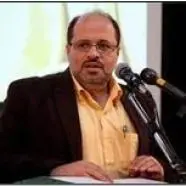Terror organization: Hamas
Status: Khaled Qaddoumi is Hamas’s representative in Tehran, Iran.
Role: Khaled Qaddoumi is Hamas’s representative in Tehran, Iran. He is responsible for raising Hamas’s interests with Iranian Supreme Leader Ayatollah Ali Khamenei and members of the Iranian government. He also acts as a public mouthpiece for Hamas to Iranian and international media.
Location: Iran.
Born: 08 Oct 1970; 01 Jan 1970;
Place of Birth: Jordan;
Gender: Male;
Nationality: Jordan;
Identification Number: 9701027203 (Jordan);
Address:
Tehran, Iran
Also Known As: Arabic: خالد القدومي) (a.k.a. AL-QADDUMI, Khaled; a.k.a. AL-QADDUMI, Khalid; a.k.a. ASAAD, Khaled Farid Ahmed; a.k.a. GHODOMI, Khaled
Activities:
Khaled Qaddoumi (Qaddoumi) is a Jordanian national and longtime Hamas member who currently lives in Tehran serving as Hamas’s representative to Iran, and acting as a liaison between Hamas and the Iranian government. Qaddoumi works to maintain strong relationships with Iran by attending delegation meetings with high-ranking Iranian officials and praising Iranian support for Hamas, including its provision of weapons.
As Hamas’s point of contact in Iran, Qaddoumi ensures a strong relationship between the two. While he maintains Iran is a “partner,” “friend,” and “supporter” of Hamas, he insists the group is not an Iranian proxy.* Yet, Qaddoumi routinely acknowledges Iranian support for Hamas, both politically and militarily. At the height of Hamas’s 11-day May 2021 conflict with Israel, Qaddoumi praised Iran for providing Hamas with knowledge and weapons to arm itself. He also called the conflict a “strategic shift” for Hamas “from defending Gaza against Israeli attacks to defending all Palestinians living in historical Palestine.”* During an anti-Israel student rally at the University of Tehran on May 13, 2021, during that month’s conflict, Qaddoumi announced Palestinians and Iranians would jointly seek the destruction of Israel.
Qaddoumi has worked to elevate Hamas’s profile in Iran, joining Hamas delegations in meeting with Khamenei and other high-ranking Iranian officials. After Iran cut back its support of Hamas in response to the terror group voicing support for protesters at the start of the Syrian civil war,* Qaddoumi participated in multiple meetings that eventually saw Iran restore its support. In January 2016, Qaddoumi met with then Iranian Foreign Minister Mohammed Javad Zarif in Tehran to discuss potential Iranian financial support for Hamas. Zarif offered to restore full Iranian support to Hamas in exchange for Hamas officially declaring its allegiance to Iran. At the time, Hamas’s leadership feared such a declaration would alienate Hamas from Sunni Arab states and ultimately rejected the deal. Nonetheless, Hamas and Iran publicly restored their ties in 2017.
Since it seized control of the Gaza Strip in 2007 and became the territory’s de facto government, Hamas has sought to moderate its image by branding itself as a legitimate resistance to Israeli occupation. In his role as an international spokesman for Hamas, Qaddoumi has embraced this narrative while also defending Hamas’s continued use of violence. On May 1, 2017, Hamas unveiled a new policy document, the first since the release of its 1988 organizational charter. The document omitted the original charter’s references to Jews and framed the Palestinian struggle as a nationalistic rather than religious one. Though the document accepted the idea of a Palestinian state along the pre-1967 lines, the charter continued to withhold recognition of the State of Israel. As the document outlines, Hamas continues to embrace “armed resistance” against Israel in its pursuit of the “liberation” of Palestine “from the river to the sea.”* In a meeting that month with the Iranian parliament speaker’s special adviser on international affairs, Hossein Amir-Abdollahian, Qaddoumi emphasized Hamas remained committed to its “previous principles” of not recognizing Israel, seeking the return of all Palestinian refugees, and maintaining the importance of Jerusalem.
Qaddoumi has also sought to internationalize the Israeli-Palestinian conflict by labeling the Palestinian issue as a shared cause and source of unity for all Muslims.* During the 32nd Islamic Unity Conference in Tehran in November 2018, Qaddoumi called Jerusalem and Palestine a “big umbrella” under which all Islamic nations can gather.* He called for “practical steps” to “confront the Zio-American hegemony in the region.”https://en.mehrnews.com/news/139908/Palestine-a-big-umbrella-that-gathers-all-Muslims-Hamas-rep. As such, Qaddoumi has rejected all normalization with Israel by Muslim nations. After condemning a June 2016 reconciliation agreement between Israel and Turkey, Qaddoumi designated normalization with Israel as “a bad thing.”* Qaddoumi condemned the August 2020 normalization agreement between Israel and the United Arab Emirates as a betrayal of the Palestinian people.
Qaddoumi continues to represent Hamas’s violent, anti-Israel agenda from Tehran. After the UAE signed its normalization agreement with Israel in 2020, Qaddoumi reaffirmed Hamas’s position that Israel “is destined for destruction and deterioration.”* He reiterated this and reaffirmed Iran’s support for Hamas during an August 2022 rally in Tehran, during which he praised Iran and the Iranian people for standing with the Palestinians against Israel.* After Saudi Arabia and Iran announced the resumption of ties in March 2023, Qaddoumi told Iranian media Hamas expects the agreement to bring dignity, authority, and stability to the Islamic community. He called Palestine the link between different parts of the Islamic ummah, which faces “a common enemy” in Israel.
Khaled Qaddoumi is being designated pursuant to E.O. 13224, as amended, for having acted or purported to act for or on behalf of, directly or indirectly, Hamas.
 Eurasia Press & News
Eurasia Press & News


